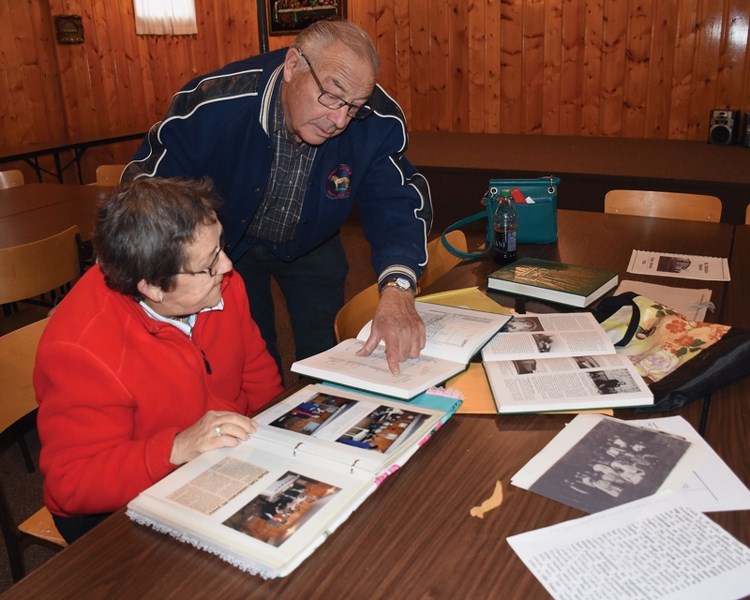It takes a lot of time, effort and patience to reach 100 years, but for the parishioners of Clyde’s St. Patrick’s Catholic Church, it was unshakable faith that helped the parish reach a century.
To celebrate the centennial and 60 years of the local Catholic Women’s League (CWL), the church and the CWL’s 20 members, are hosting a potluck lunch Nov. 27 at the Clyde and District Senior Drop In Centre following the noon mass. A hundred years holds a wealth of history, as does Westlock resident Howard Ringstad, who has lived most of it in his 78 years.
From birth he was part of St. Patrick’s, the place where he was baptized, confirmed, and now plans to be buried next to his parents and grandparents.
“Church is not a hotel for saints, it’s a hospital for sinners,” he said. “We don’t come here because we’re perfect.”
Construction began in 1915, however the parishioners ran out of money and the Dominion Lumber Company threatened to seize it.
“Finally when they got a priest in here and the economy turned around, then they finished the church,” he said.
The church was completed in 1916 and started off as a mission, which meant its first priest Father Aubin Huet travelled by horse and buggy to churches in Tawatinaw, Clyde and beyond.
Before that, parishioners went to Protestant Hill, a Catholic church halfway between Westlock and Clyde and about three kilometres south, Ringstad estimated. A few years after St. Patrick’s was built in 1920, Protestant Hill and all its records were lost to a fire.
Because that church was out in the bush, some families moved their loved ones — including Ringstad’s grandfather — out from the cemetery to the St. Patrick’s cemetery.
About 10 years after his grandfather’s death, his uncle Joe made the journey from what Ringstad called “the boonies” to Clyde.
“They decided to have a look at him, so (Uncle Joe) said when they opened the coffin, and really, outside of the fact he had shook down in the rough wagons and his nose was resting on the coffin and there was an indent there, he said he looked pretty good,” Ringstad said.
A few headstones remain at the original site at Protestant Hill, hidden behind thick and overgrown bush.
As decades filled with weddings, funerals and baptisms, age took its toll on the church.
“The guy right beside it was melting and the guy in the back was freezing his assets off,” said Maureen Parrent, past-president of the CWL, who joined the church in 1970 when she married her husband and local farmsteader Maurice Parrent.
Eventually, a new church was built next door in 1961, and the original building — then 45 years old — was knocked down. Now 55, the new building has received its share of upkeep, with a metal roof and new carpets going in two years ago and a hot water heater last year.
Parrent fondly recalled the first time she met the CWL, where Ringstad’s mother was a founding member.
“A lot of the ladies from the original families were still here and, oh man, they were so friendly and so helpful,” she said. “I grew up right in Barrhead and went to the United Church. I got a little disillusioned because I don’t believe in ‘go to church Sunday and you’re holier than thou, and you’re not a good Christian the rest of the week.’ I felt so welcomed by all the people in the parish when I married Maurice.”
Reminiscing about the priests who led the congregation and the Christmas concerts through the years, Parrent and Ringstad remembered most the chicken suppers, a joint effort between the Clyde United Church and St. Patrick’s.
Every fall, the United Church hosted a chicken supper cooked up by members from the Catholic Church. The next Wednesday, they would switch off so that everyone had a chance to kick up their feet and enjoy.
“They supported each other’s chicken suppers,” Parrent said. “That’s how they raised the money to pay for their churches.”
“In the later years, with less workers, they came together and shared a supper,” Ringstad added. “This was a very good ecumenical community. It was the Anglican, the United and Catholic Church and everybody worked together.”
However, things at the church have changed. The chicken suppers have since been cancelled and Parrent wished they could bring back the St. Patrick’s tea and bake sale that was once held every March 17 in the basement.
“The attendance at any church anywhere has generally fallen off, especially among young people,” she said. “Many of the parishioners now, compared to when I got married, they have jobs during the week, during the day or maybe even shift work.”
“With telephones now and the communication system the way it is, there’s less need for small-town community life,” Ringstad added. “The Clyde group, although small, is still a vibrant community.”
In the last 20 years, the church downsized and became a mission of Thorhild and then a mission out of Westlock.
“In the early days, the priests were different too,” Ringstad said. “Father (Peter) Sullivan, he helped build the Community Hall down here with his shirtsleeves rolled up, he was one of the head carpenters. He used to go out and play cards and drink whiskey with anybody. He didn’t care if it was Protestant or what it was. That was something that I thought was customary for the world, that all religions loved each other and treated each other with respect. We grew up that way.”



